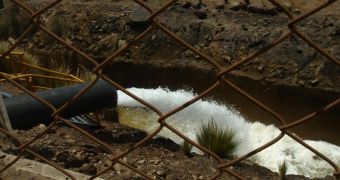Micromidas’ innovative technology of turning sludge into plastic might turn out to be a brilliant business strategy while also trying to cure America's increasing oil dependency once and for all.
Officials from this company thought about a better, greener way of managing the 150 million gallons of wastewater that has to be processed in water treatment facilities every single day.
Filtered water is usually poured into rivers or oceans, and after this process is completed, approximately 4 million tonnes of human waste are left behind, which are burned or sent to landfills.
The entire operation is not only inefficient, it is also expensive since it takes $200 million out of the local administrations' pockets every year.
People behind the Micromidas project agreed upon the fact that something profitable and earth-friendly has to come out of this smelly business and so they relied their research on the fact that a chemical found in wastewater can be exploited to manufacture plastic.
Surprisingly, the process seems to be similar to brewing bear. The enterprise collects impressive amounts of sludge and it uses a cocktail of bacteria microbes that generate chemical reactions.
The result is a thicker product, that goes through a machine which turns it into plastic, in the end.
If the idea is implemented on a national scale, it could imply considerable profit margins for the innovative company.
The manufacturers' main challenge is to improve the entire process while making it competitive with oil, one of the main rivals in the business of obtaining plastic.
Nowadays, 300 million barrels of oil are being used only in the plastic industry, annually. Using human waste to obtain bioplastic in a sustainable manner would not only influence in a positive way the enterprise's profit, it would also be in favor of the environment.
Researchers succeeded to obtain bioplastic in the bast, but it seems that these eco-substitutes failed to concur the market because they are actually more expensive than oil-based items, due to the fact that they are obtained from plants and they require fertilizers, water and land usage.
Micromidas will launch its innovative products next year, while trying to convince a larger segment of the population that its bioplastic is 100% earth-friendly, cost-efficient and doesn't smell like poop.

 14 DAY TRIAL //
14 DAY TRIAL //